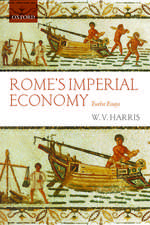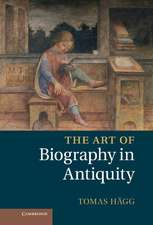Tragedy on the Comic Stage
Autor Matthew C. Farmeren Limba Engleză Hardback – 29 dec 2016
Preț: 552.48 lei
Preț vechi: 791.24 lei
-30% Nou
Puncte Express: 829
Preț estimativ în valută:
105.72€ • 115.19$ • 89.08£
105.72€ • 115.19$ • 89.08£
Carte tipărită la comandă
Livrare economică 12-18 aprilie
Preluare comenzi: 021 569.72.76
Specificații
ISBN-13: 9780190492076
ISBN-10: 0190492074
Pagini: 282
Dimensiuni: 236 x 157 x 31 mm
Greutate: 0.57 kg
Editura: Oxford University Press
Colecția OUP USA
Locul publicării:New York, United States
ISBN-10: 0190492074
Pagini: 282
Dimensiuni: 236 x 157 x 31 mm
Greutate: 0.57 kg
Editura: Oxford University Press
Colecția OUP USA
Locul publicării:New York, United States
Recenzii
Farmer makes a convincing case for reading Aristophanes alongside the fragments of contemporary plays and for the importance of paratragedy in old and middle comedy. Anyone interested in Greek drama will enjoy and benefit from this book. ... Summing Up: Recommended. Lower-division undergraduates through faculty.
Farmer thus offers many valuable insights, but also many interpretations whose appreciation would require a literary culture almost as deep as Aristophanes own, if not considerably deeper.
Despite the difficulties posed by a crowded field and difficult source materials, Matthew C. Farmer has written a book about comedy, and comic fragments in particular, which is not only witty but important ... The material he gathers is rich and exhilarating. We get "a sort of backstage view of the tragic competition, with tragedians, fans, and audience members arguing about their favourite poets, planning their next productions, and complaining about the state of tragic poets today". We hear complaints about weak plots and crazy producers: "why didn't he give Sophocles a chorus when he asked for one, but employed the son of Cleomachus instead, a man I would not rate worthy of a chorus even for the Adonia" (an inferior festival specifically for women). We discover that certain playwrights were a right pain when rehearsing the chorus, while others were firm favourites. "I am consumed with longing for Euripides!"
Farmer's study is a welcome addition to our understanding of the way Aristophanes and other comic playwrights engaged with Greek tragedy ... This is really a book about trugoidia, comedy that emphasizes "the agonistic relationship between comedy and tragedy". We might call it "comedy with an attitude." ... There are, to my mind, no missteps in Tragedy on the Comic Stage. Farmer is respectful of the evidence, especially of the fragments, yet imaginative in teasing out ideas ... I found [the] book to be clearly written and free of jargon, with appropriate sign-posting; the arguments flow smoothly ... Tragedy on the Comic Stage is more than a synthesis; it offers a systematic new perspective on how the two genres interacted.
Farmer thus offers many valuable insights, but also many interpretations whose appreciation would require a literary culture almost as deep as Aristophanes own, if not considerably deeper.
Despite the difficulties posed by a crowded field and difficult source materials, Matthew C. Farmer has written a book about comedy, and comic fragments in particular, which is not only witty but important ... The material he gathers is rich and exhilarating. We get "a sort of backstage view of the tragic competition, with tragedians, fans, and audience members arguing about their favourite poets, planning their next productions, and complaining about the state of tragic poets today". We hear complaints about weak plots and crazy producers: "why didn't he give Sophocles a chorus when he asked for one, but employed the son of Cleomachus instead, a man I would not rate worthy of a chorus even for the Adonia" (an inferior festival specifically for women). We discover that certain playwrights were a right pain when rehearsing the chorus, while others were firm favourites. "I am consumed with longing for Euripides!"
Farmer's study is a welcome addition to our understanding of the way Aristophanes and other comic playwrights engaged with Greek tragedy ... This is really a book about trugoidia, comedy that emphasizes "the agonistic relationship between comedy and tragedy". We might call it "comedy with an attitude." ... There are, to my mind, no missteps in Tragedy on the Comic Stage. Farmer is respectful of the evidence, especially of the fragments, yet imaginative in teasing out ideas ... I found [the] book to be clearly written and free of jargon, with appropriate sign-posting; the arguments flow smoothly ... Tragedy on the Comic Stage is more than a synthesis; it offers a systematic new perspective on how the two genres interacted.
Notă biografică
Matthew C. Farmer is Assistant Professor in the Department of Classical Studies at the University of Missouri.















